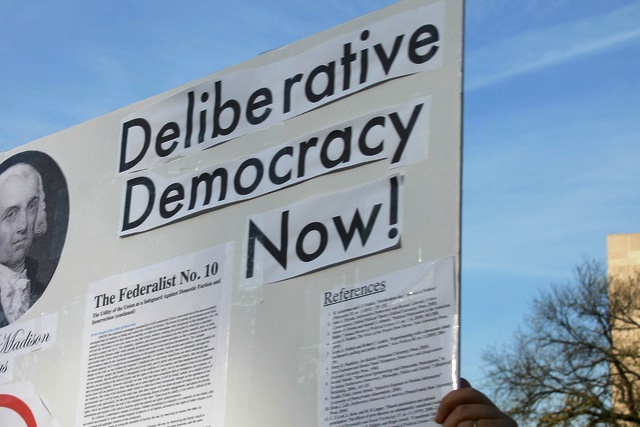Deliberative democracy is starting a quiet democratic revolution worldwide
Tomorrow marks the beginning of a series of citizens’ assemblies, organised by the Electoral Reform Society in partnership with academics from Sheffield, Southampton and London, which will be taking place in Southampton and Sheffield over the next month. In this article, Chris Terry discusses the trend of grassroots deliberation which has been gaining momentum since the late 1980s. He argues deliberative democracy tools can help to improve and legitimise political decision-making in an age of detachment from traditional political elites.
We have all heard it, perhaps even felt it ourselves. Representative politics is too distant, politicians seem not to understand us, or be like us.
Changing the structures of politics to make them more representative, alongside direct democracy through referendums, can certainly alleviate that gap, and have their positives and negatives. But a different approach to democracy is gaining traction under the radar.
I’m talking about deliberative democracy. In reality, it’s not a new form of democracy at all. Deliberative democracy returns to the founding principles of Athenian democracy – the direct involvement of citizens in decision-making – and updates them for the 21st century. It involves getting small groups of citizens together, carefully selected to be representative of the population, before informing them about a topic, and then having them deliberate on what they have heard over the course of a defined time period. Through this, deliberative democracy hopes to get a clear consensus from citizens on how to deal with major issues of the day.
And it’s an idea that’s been gaining momentum all over the world.
In Porto Alegre in Brazil in 1989, ‘participatory budgeting’ was created. This programme occurs annually with neighbourhood, regional and citywide assemblies deliberating on the spending of the $200 million USD construction and services budget. Of a population of 1.5 million, around 50,000 citizens take part in the process. A World Bank paper found that the process was associated with an increase in sewer and water connections reaching 75% to 98% of households by 1998, a quadrupling in the number of schools, increased spending on health and education, and improved conditions for the poor. Since then participatory budgeting has spread throughout Brazil.
Belgium has seen the G1000 project, founded in response to Belgium’s failure to form a government for 589 days, and the ‘Citizens’ Cabinet’ in which the Flemish Ministry of Culture has added an extra democratic layer in the decision-making process to legitimise policies. South Australia runs a series of deliberative events known as Better Together.
This quiet revolution has come to Britain too. Since being introduced in 1996, local government has frequently made use of citizens’ juries, and the NHS Citizen programme hopes to bring deliberative democracy to the heart of Britain’s healthcare system.
And on constitutional issues there is an increasing move towards participation of this kind whether through assemblies in British Columbia, Ontario, Iceland or Ireland.
Deliberative democracy is not a replacement for traditional democratic structures. Rather it should be thought of as an addition to them. By involving ordinary citizens in the process of political decision-making, these tools can help to improve and legitimise political decision-making in an age of detachment from traditional political elites.
Perhaps one of the greatest challenges for the UK’s political elites is devolution. Since the Scottish independence referendum the constitution of the UK seems weaker and more fractured than ever. A patchwork of devolution settlements exists, stewarded in a top-down way by political elites. This is not the way to build a lasting, sustainable UK constitutional settlement.
That is why the Electoral Reform Society, together with academics from the Universities of Sheffield, Southampton, London and Westminster, is running two Citizens’ Assemblies in Sheffield and Southampton over the next month, looking at how those areas should be run in the new devolution age.
We hope that this will only be the beginning, building towards a national citizens’ convention to look at Britain’s democratic future and how the UK works together. Whatever the future of the Union, it is vital that our institutions have the legitimacy that can only be conferred by a grassroots re-evaluation of our political processes. Our democracy is changing – and it’s time citizens had a say how.
—
Note: this post represents the views of the author, and not those of Democratic Audit or the LSE. Please read our comments policy before posting.
—
 Chris Terry is a Research Officer at the Electoral Reform Society
Chris Terry is a Research Officer at the Electoral Reform Society






 Democratic Audit's core funding is provided by the Joseph Rowntree Charitable Trust. Additional funding is provided by the London School of Economics.
Democratic Audit's core funding is provided by the Joseph Rowntree Charitable Trust. Additional funding is provided by the London School of Economics.
RT @UKAssemblies: Deliberative democracy is starting a quiet democratic revolution worldwide https://t.co/x2jMVwJoLY ERS’ @CJTerry blogs for…
In the UK the PB network have been working hard to spread the message about deliberative democracy, and specifically Participatory Budgeting. Do feel free to check out the news and stories on our website https://www.pbnetwork.org.uk, and if you can make it to Birmingham next Monday 26th, why not come to our national Unconference, where you can hear about a huge variety of work in this field happening on your dorstep. Check out https://www.eventbrite.co.uk/e/pb-network-national-conference-tickets-17843817338
#deliberativedemocracy https://t.co/Gx5VIlS7MS #reformingdemocracy
[…] Democratic Audit UK Deliberative democracy is starting a quiet democratic revolution worldwide Democratic Audit UK Changing the structures of politics to make them more representative, alongside direct democracy through referendums, can certainly… […]
There will be an Assembly for Democracy at the Waterloo Action Centre in London on the 14th of November – attended by John McDonnell. See here for more details and to book a place: https://assembliesfordemocracy.org/
Deliberative #democracy is starting a quiet democratic revolution worldwide https://t.co/Odi4eLVIw7 via @democratica… https://t.co/aPf4ja9ReQ
Deliberative democracy is starting a quiet democratic revolution worldwide says @CJTerry of @electoralreform https://t.co/EyXkcvzWQU
[…] We hope that this will only be the beginning, building towards a national citizens’ convention to look at Britain’s democratic future and how the UK works together. Whatever the future of the Union, it is vital that our institutions have the legitimacy that can only be conferred by a grassroots re-evaluation of our political processes. Our democracy is changing – and it’s time citizens had a say how.” https://www.democraticaudit.com/?p=16848 […]
Deliberative democracy is a feeble alternative to Swiss style direct democracy.
Deliberative democracy is starting a quiet democratic revolution worldwide : Democratic Audit UK https://t.co/HQMKnG6Xyo
Deliberative democracy is starting a quiet democratic revolution worldwide https://t.co/zcoxNFDAIX
Deliberative democracy – a quiet revolution. And @UKAssemblies (starting this w/e) are the next step https://t.co/rTfapAzh2q (by @CJTerry)
Deliberative democracy is starting a quiet democratic revolution worldwide https://t.co/nhOq8nSaFl https://t.co/R9dgodS6ZJ
@democraticaudit why is this different to notorious “focus group” policy making?